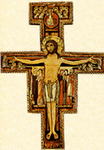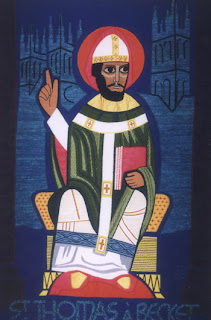"Have mercy on me, O God, according to your goodness; in your abundant compassion blot out my offense." Psalm 51:3 (The "Miserere" Psalm)
How many of us plan to "give things up" for Lent? Maybe we've been thinking about chocolate, or soda pop, or snacks between meals. Maybe we've thought it's a good time to actually fulfill those New Year's resolutions we were so determined to do on 31 December!
However, it seems to me, this misses the point of Lent. Lent is the time the entire Church -- East and West, Protestant, Catholic and Orthodox (although on a different calendar) -- journey together prayerfully toward the great celebration of the Lord Jesus' Paschal Mystery. It all aims toward the Sacred Triduum (Three Days) of the end of Holy Week toward Easter.
The Roman, or Western, Tradition solemnly begins Lent on Ash Wednesday with the marking of ashes on the forehead or sprinkling ashes on the top of the head (as is done in parts of Europe). The Byzantine Tradition begins on the evening of Cheese-Fare Sunday (this past Sunday) with Forgiveness Vespers, a penitential ceremony at the end of which the priest and congregation mutually ask forgiveness of one another and embrace one another in peace.
It is the time of the Great Fast, a time to refrain from regular life and to purposely prepare to deepen one's relationship with the Lord together with the entire Church. What a great retreat -- and we get to do it together with all our brother and sister Christians around the world! Praise God!
But, as I stated above, it's more than "giving up" something. It really is a matter of growing in Christian maturity, letting Jesus Christ genuinely be who he says he is in our lives. He is Lord, he is Savior, he is Master, he is the Good Shepherd, he is Son of God, he is Bread of Life, he is Resurrection and Life, he is the Way, the Truth and the Life -- and the list, of course, goes on.
So Lent is not a matter of taking advantage of a church time to lose weight, or exercise, or other such practices about us. It's about focusing on the Lord Jesus.
This is what St. Francis of Assisi and St. Clare of Assisi both understood intuitvely and practiced. The earliest Franciscans were known as the "Penitents of Assisi". Penance was a popular devotion in the Middle Ages, even into the Modern age. Some of the physical rigors we would consider odd or even bizarre today.
But the overall purpose of the penance that Sts. Francis and Clare practiced was to turn their minds and hearts to the Lord. That's the purpose of Franciscan penance; that is the purpose of Christian penance! It is to deliberately rid ourselves of unnecessary distractions (TV? ipods?), that which can separate us from the Lord, at least for the period of this retreat of forty days. And it is to face the temptations in our lives, by God's grace, and know the victorious power of the Lord's love over them. Even when we fail!
 St. Francis of Assisi, as a young man, praying before the San Damiano Crucifix: "Lord, who are you . . .? And, who am I . . .?" His prayer in this run down chapel was pivotal in his conversion to the Lord. This was where he heard the Lord Jesus speak to him from the Cross and say, "Francis, go repair my Church, which you see is falling into ruin!"
St. Francis of Assisi, as a young man, praying before the San Damiano Crucifix: "Lord, who are you . . .? And, who am I . . .?" His prayer in this run down chapel was pivotal in his conversion to the Lord. This was where he heard the Lord Jesus speak to him from the Cross and say, "Francis, go repair my Church, which you see is falling into ruin!"
As we turn to the Lord we are changed! The fruit of the Spirit (cf. Gal. 5:22-23) become more evident in our lives. The image of the Lord Jesus becomes more manifest and visible in our attitudes, our ways of speaking, our ways of acting and interacting.
This was what was so attractive about St. Francis and the Francisans, both men and women. Although quite imperfect, they were willing to grow in holiness as men and women of penance. It is about becoming conformed to the Lord Jesus.
In a word, we are undergoing
conversion! Conversion from our selfishness to the Lord's own selflessness through acts of generosity and almsgiving (outreach to the poor); from self-preocupation to concern about what the Lord wants for us through self-abnegation (fasting); from vanity and self-absorption to deeper love of God and neighbor through prayer.







.gif)
